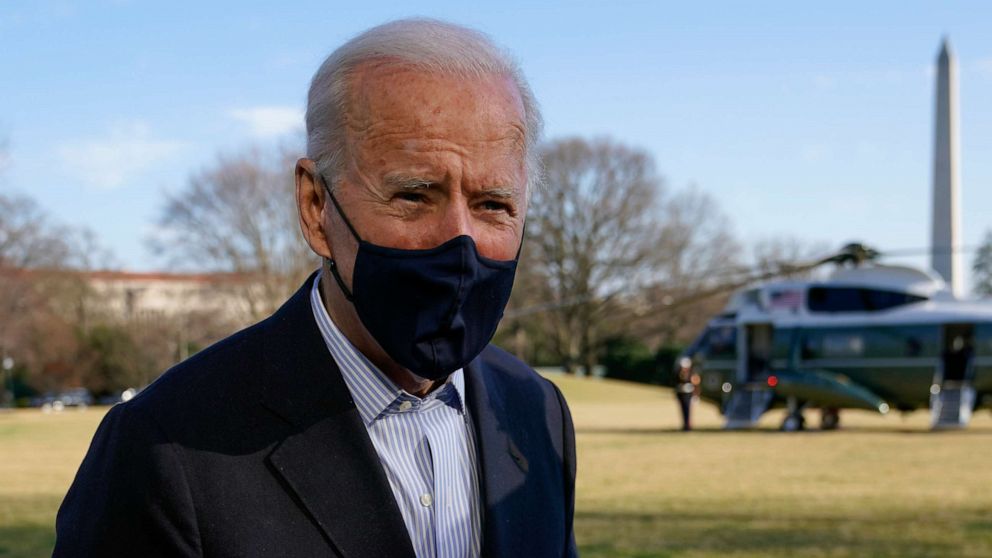Caveats keep Biden border policies muddled: The Note
The TAKE with Rick Klein
It is, of course, not accurate to suggest that the crisis at the border -- and it is that, White House labeling aside -- is entirely the fault or the responsibility of President Joe Biden.
It is also incorrect to suggest that the president and his new policies (or lack thereof) bear no blame at all.
The politics of the moment are such that the Biden administration is relying on nuance in a realm where the clarity of statements matters in real time. Even now, despite what at least one House Democrat calls "a terrible message" for would-be migrants being asked to wait for new processes to be set up, critical language is coming with caveats.
"The message is quite clear: Do not come. The border is closed. The border is secure," Homeland Security Secretary Alejandro Mayorkas said Sunday on ABC's "This Week," echoing Biden's own comments in an ABC News interview last week.
As he went on, Mayorkas added a single word that could change the way the message is heard: "Now is not the time to come."
Now, though, is the time that people are coming. Many of them are children, and they are traveling in numbers not seen in decades -- in many cases precisely because they know they will be more welcome in the country than they would have been under the previous administration.
The administration can blame the messy transition, the dysfunction or even the inhumanity of Trump-era policies. But officials can't claim they weren't warned, or that they didn't imagine there would pressure for new, swift solutions to intractable problems.
This represents a distraction for Biden, though also more than that, as lives are literally at stake. The growing concern among Democrats is that failure to manage this crisis effectively will sap the political will for broader reforms, at the very moment that Democrats may be most powerful in Washington.
The RUNDOWN with Averi Harper
The House Oversight Committee is slated to hold a hearing on a bill that could make Washington, D.C., the 51st state and will include testimony from Mayor Muriel Bowser, other D.C. officials and advocates.
The possibility of D.C. statehood isn't only significant for the autonomy it would offer D.C. officials to make decisions, like calling on the National Guard to respond to security threats or having the final say regarding their own budget, but it could also have an impact on the balance of power in Congress.
Former President Donald Trump articulated the Republican argument against D.C. statehood bluntly in an interview last year with the New York Post. "You mean District of Columbia, a state? Why? So we can have two more Democratic -- Democrat senators and five more congressmen? No thank you. That'll never happen," said Trump. Of course, because of its small population (around 714,153), D.C. would only get one House member.
The House passed a bill on statehood last June. It didn't go far due to the staunch opposition of senate Republicans, but in the current political climate, it is a possibility. Democrats boast the majority in both the House and Senate, even if by narrow margins.
Biden has previously expressed support for D.C. statehood and White House press secretary Jen Psaki told reporters Thursday Biden believes the people of the district deserve representation. Still, the effort, like much of Biden's agenda, could be obstructed by senate Republicans if the requirement of 60 votes to pass legislation remains intact.
The TIP with Alisa Wiersema
The outcome of a pair of noteworthy, albeit predictable, Louisiana special elections this weekend offered a glimpse at the stakes both parties could be facing in the House, with at least three more specials on the horizon this year. Democrats saw their majority shrink by one more seat on Saturday as they look to defend two blue seats this year in Ohio and New Mexico.
Meanwhile, Julia Letlow's overwhelming yet bittersweet win in Louisiana's 5th Congressional District gave Republicans a glimpse at how the pandemic could affect the race for Texas' 6th Congressional District later this spring. Both districts were previously represented by Republicans who passed away due to complications with COVID-19.
Going into Saturday's election, Letlow -- who ran to fill the void of her late congressman-elect husband -- was backed by high-profile Republicans, including Trump, and went on to win by a landslide. She will now bolster the ranks of GOP women in the House.
Notable endorsements also played into Louisiana's 2nd District, where two Democrats, Troy Carter and Karen Carter Peterson, are now headed into a runoff. Carter, who was endorsed by the district's former congressman, Cedric Richmond, got the most votes out of 15 candidates competing in Saturday's contest, and Carter Peterson came in second. The two state legislators will duke it out again on April 24.
THE PLAYLIST
ABC News' "Start Here" podcast. http://apple.co/2HPocUL
Monday morning's episode features ABC News Chief Global Affairs correspondent Martha Raddatz, who tells us about her trip to the U.S.-Mexico border as the migrant crisis there deepens. ABC News' Victor Oquendo explains why police used force to break up spring break crowds in Miami. And ABC News' Ines De La Cuetara joins us from Paris, where the city is entering another COVID-19 lockdown.
WHAT YOU NEED TO KNOW TODAY
Download the ABC News app and select "The Note" as an item of interest to receive the day's sharpest political analysis.
The Note is a daily ABC News feature that highlights the key political moments of the day ahead. Please check back tomorrow for the latest.




